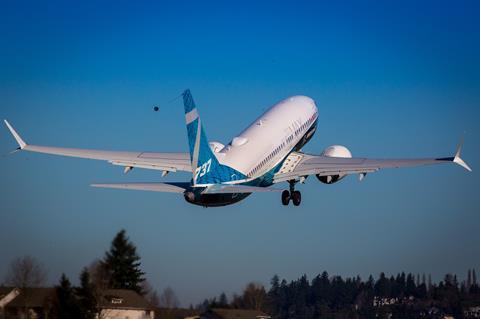Boeing was late in providing some 737 Max 7 assessments to the Federal Aviation Administration, cutting the agency’s available time to certificate the jet before a critical December deadline.
The FAA brought the timeline crunch to Boeing’s attention in a 19 September letter to Mike Fleming, Boeing’s senior vice-president of the 737 Max’s return to service.
Reuters reported about the letter on 29 September.

“As you are aware, the FAA communicated that Boeing must turn in all remaining System Safety Assessments (SSA) by mid-September if the company intends to meet its project plan of completing certification work (and receiving FAA approval for this airplane) by December 2022,” says the letter, signed by FAA executive director of aircraft certification Lirio Liu.
As of 15 September, the FAA had accepted about 10% of the Max 7 assessments and was reviewing another 70%, says the letter.
“Most concerning, however, is that Boeing has yet to provide an initial submittal for six of the outstanding SSAs,” it adds. “We expect many of these documents will take significant time to review due to their complexity and bearing on the overall safety of the new aircraft.”
Additionally, Liu’s letter cites “continuing” discussions between Boeing and the FAA “about realistic timeframes for receiving the remaining documents”.
The US manufacturer has been working to get the Max 7 certificated before a December deadline after which newly certificated aircraft will require a type of modern cockpit alerting system that Max jets lack.
The company is also working to certificate the Max 10 sometime after the Max 7.
Asked to comment, Boeing says it “is focused on meeting all regulatory requirements to certify the 737-7 and 737-10, and safety remains the driving factor in this effort”.
“We will continue to prioritise being thorough and transparent in our documentation and interactions with the FAA, and following established processes to ensure safety and compliance above all else,” it adds.
The FAA will “maintain sufficient staffing to complete the necessary safety reviews in a timely manner,” the agency’s letter adds. “But such work must be completed deliberately and in such a way that an arbitrary calendar date does not become the driving factor.”
The cockpit alert requirement comes from a law signed by President Donald Trump on 27 December 2020. Starting two years after its enactment, the FAA cannot certificate transport aircraft lacking a “flight crew alerting systems”. That requirement stemmed from two 737 Max crashes.
As recently as 21 September, Boeing chief executive David Calhoun said he thought the Max 7 would make the December deadline.
“I do. I do,” Calhoun had said when asked.
He was less optimistic the Max 10 will make the cut, saying, “There’s a chance”.
Calhoun also said Boeing would seek an “extension” if the Max 7 or 10 certifications extend beyond the deadline.


























